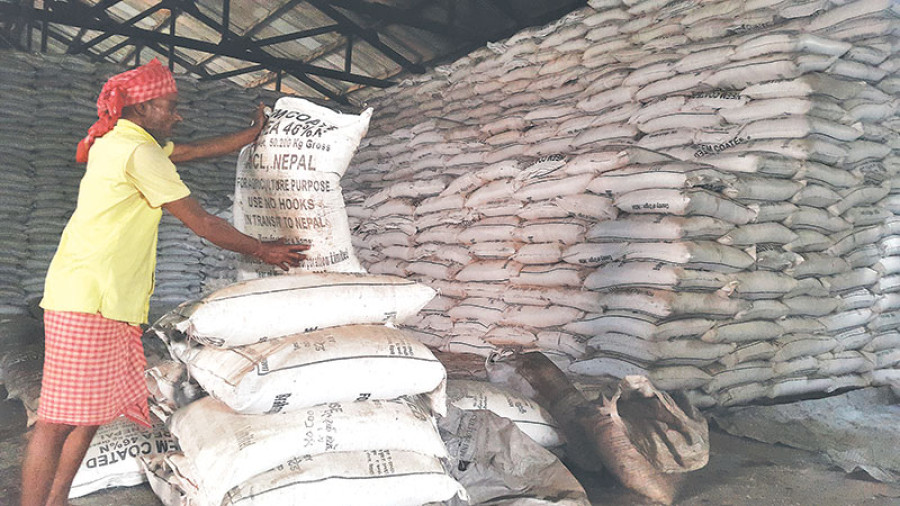Money
Nepal to import fertiliser under govt-to-govt deal
The government has decided to formally request India to provide chemical fertiliser under a government-to-government (G-2-G) deal to avoid long procedural hassles and prevent a possible shortage of the farm input.
The government has decided to formally request India to provide chemical fertiliser under a government-to-government (G-2-G) deal to avoid long procedural hassles and prevent a possible shortage of the farm input.
A request letter that will be sent to the Indian government through the Ministry of Foreign Affairs has proposed a G-2-G deal to procure chemical fertiliser for at least five years at the international parity price.
As per the proposal, the ministry plans to import 150,000 tonnes of fertiliser (urea 100,000 tonnes and potash 50,000 tonnes) under the G-2-G scheme this fiscal year.
The total requirement of the chemical fertiliser for this fiscal year has been estimated to be 307,700 tonnes, including 180,000 tonnes of urea, 120,000 tonnes of Diammonium phosphate (DAP) and 7,500 tonnes of potash.
“The scheme, however, will be applicable only when the country faces a shortage of chemical fertiliser,” said Agriculture Secretary Yubak Dhoj GC. “As a lengthy procedure is involved in procuring chemical fertiliser, we can directly procure the farm vital inputs from India without going through tendering process during an emergency.”
The ministry has proposed the scheme for five years. In the second year, the ministry has proposed to import 170,000 tonnes of fertiliser under the G-2-G scheme, 195,000 tonnes in the third year and 210,000 tonnes each in the fourth and fifth years.
“These are the projected quantities,” said GC, adding that the scheme would ensure regular supply of fertiliser during times of crisis when Nepal is implementing the 10-year Prime Minister Agriculture Modernisation Project that aims to increase agriculture production. “We will be going through both procurement models: G-2-G deal and regular global tendering procurement process.”
According to Agriculture Inputs Company (AIC), it normally takes six months to procure chemical fertiliser following a global tender call under the Public Procurement Act. And in case the procurement is cancelled due to price volatility or other factors, there will be havoc in the farm sector, the AIC said.
Under a Nepal-India treaty signed in 2009, India has agreed to sell 100,000 tonnes of chemical fertiliser (60,000 tonnes of urea and 40,000 tonnes of DAP) to Nepal annually at the international parity price to avoid procedural hassles.
The Agriculture Ministry’s statistics show that the distribution of chemical fertiliser reached an all-time high of 298,677 tonnes in 2014-15. During that year, the average fertiliser consumption was recorded at 96.63 kg per hectare, the highest consumption so far.
However, fertiliser imports plunged to 135,493 tonnes in 2015-16 due to a trade embargo by India. An ensuing shortage and summer and winter droughts led to Nepal’s farm sector seeing a negative agricultural sector growth for the first time in 2015-16.
In 2016-17, the supply of chemical fertilisers reached a record 330,000 tonnes due to a fall in global prices and stocks that remained unused due to the Tarai agitation and subsequent trade embargo in 2015-16.
Nepal’s annual imports of chemical fertiliser are worth around Rs16 billion. According to the Agriculture Ministry, the annual demand for chemical fertiliser currently stands at 723,000 tonnes. Subsidised fertiliser covers only one-fourth of the country’s total requirement, and the rest is met by informal imports, or shipments smuggled through the porous border with India.
A study conducted by the Finance Ministry in 2006 has put the share of informal fertiliser imports at 71.6 percent of total supplies. Private companies in Nepal are reluctant to trade fertiliser due to its high costs and risks, and all imports and distribution are done by state-owned AIC and National Trading Limited.




 17.52°C Kathmandu
17.52°C Kathmandu














